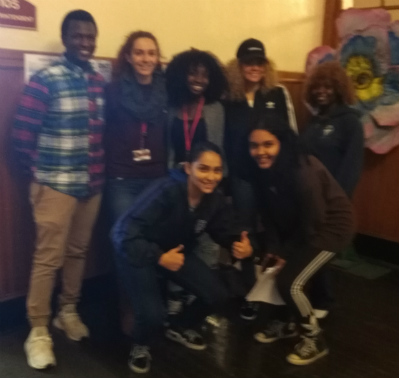WORCESTER, Mass. – On Jan. 24, local residents will again have an opportunity to voice their opinions and concerns about the future direction of the Worcester Public Schools (WPS), as an unprecedented, community-driven data gathering process continues, the ultimate goal of which is to create the schools’ first new strategic plan since Will Smith was still The Fresh Prince.
The need for a new plan
“One of the shocking realities is that we have not had a strategic plan for the district since 1992,” said Jennifer Carey, executive director of the Worcester Education Collaborative (WEC), the community organization spearheading, along with the Worcester Regional Research Bureau, the drive to create the new plan.
“That was the year before education reform, which changed the landscape for education dramatically in this state,” Carey told me, explaining why she and WEC thought a new plan was so urgent. “It was before No Child Left Behind, it was before the Every Student Succeeds Act, it was before a lot of changes in the approach to education, the policy approach to education. It was also before the changes in technology with respect to education, the changes in the composition of our student body both in terms of ethnicity and in terms of income, and in terms of special education. So there really has not been a considered plan on how we’re going to move forward as a district.”
An opportunity arises
A transition in WPS leadership, the departure of former superintendent Melinda Boone in 2016, was seen by the WEC and the WRRB as an opportunity for the city to create a new plan. While it was initially hoped that a plan could be created before a new superintendent was hired, the school committee quickly appointed Maureen Binienda to the position. However, Binienda agreed that a new plan was a worthwhile undertaking.
Starting the process
In its efforts to create the document, WEC has employed a process that is a radical departure from the way a strategic plan might have been created in the past. Previously, administrators would likely meet with education experts, study statistics and the literature, and create a plan, which would then be shown triumphantly to the public. Now, however, the experts and quantitative data remain, but the community is directly involved with, and a key part of, creating the plan.
WEC created an advisory committee of nearly 50 people, which is composed of community representatives, parents, business leaders, the teachers’ union president, faith leaders, and recent WPS alums. More than a third are from communities of color. A coordinating committee was created, as well as several subcommittees, each of which focused on different areas that the plan must address. Each subcommittee has advisory committee members as well as additional community members, and is at least as reflective of communities of color as the overall committee.
Next, WEC brought on the Rennie Center, a Boston-based education consultancy to ensure that best practices were followed, as well as to help analyze and organize the data gathered into a coherent plan. The data is both quantitative (statistics and numbers) and qualitative (stories and comments from community members).
A grassroots approach
Three community forums were held, in July, October, and, most recently, in December at Doherty High School. The first forum, held at the MCPHS Worcester campus, helped to set the agenda: the Rennie Center took public comments made at that forum, and divided them into different “themes” that community members – parents, students, nonprofit and faith leaders – found important. They included social and emotional learning, continuing professional development for teachers, academics, and technology.
“Interestingly for the folks who had been doing education for a number of years,” Carey reflected, “the themes that are coming up are the themes that you would expect to come up.”
Still, however, the planners wanted to dive even deeper, and, concurrently with the community-wide listening sessions, organized 15 focus groups, composed of WPS parents and students. The focus groups were created so that students and parents could freely speak their minds. According to Carey, “We wanted to get into the real, lived experience, which is much more personal, and sometimes can be very emotional. We wanted to provide a more intimate, safer space for people to be able to talk about their real experiences with the schools: their hopes, their expectations, and their frustrations.”
Students and parents in the groups were separated into different rooms, so that young people felt they could speak freely. Part of the reason for hiring an out-of-town firm, the Rennie Center, as a consultant, was so that the groups could be run by people that participants “would not run into in the grocery store,” thus providing an even safer space for unfiltered discussion. Carey said that, while statistics are highly important, they are “cold without the story that goes with the data. We thought it was important to have the story, to have the lived experience, that goes with the numerical indicators.”
Ensuring diverse opinions
In order to reach communities that are often overlooked and ignored, organizers worked intentionally with specific community organizations to find participants. These organizations included African Community Education, Latino Education Institute, Belmont AME Zion Church, the Citywide Parents Planning Advisory Council, the Worcester Youth Center, the Southeast Asian Coalition, the Worcester Community Action Council, and others.

The organizers are also looking at any other data they can obtain, including the transcript of the “Schools We Deserve” dialogue, which was independently organized in August by an ad hoc group of WPS high school students.
The results of the discussions, as well as the data, will be the constitutive parts of the plan, which is hoped to be presented to the administration, the school committee, and city council by the end of February. Carey hopes that the community will take ownership of the plan, as it will require advocacy, especially in securing Chapter 70 funding that the state owes Worcester and other Gateway Cities.
New process, inevitable confusion
Despite all the public participation, the planning process has garnered some criticisms. While they are generally vague, some have suggested that the planners ignored communities of color.
“I woke up this morning an African American woman, just like I have for the past 61 years,” Carey said when I asked her about this charge. Given the process, she said, “I’m stunned that people are saying that.” She added that anyone is free to get in touch with her.
Some frustrations were evident at the Dec. 20 forum at Doherty Memorial High School, which was to have been the final. However, it was apparent that many of those frustrated thought that some plan had already been created, and were disappointed that organizers weren’t more forthcoming with the details. However, there is no plan yet.
Moving forward
In light of the confusion, and hoping to get ore community input, another forum is being organized for Jan. 24 at 6pm at Claremont Academy. Everyone is welcome and encouraged to show up and provide input as to what they want to see in the public school system.
Those who have not been able to attend a forum or a focus group are still able to give their thoughts on what the schools should look like in the coming years, by completing a survey here.




